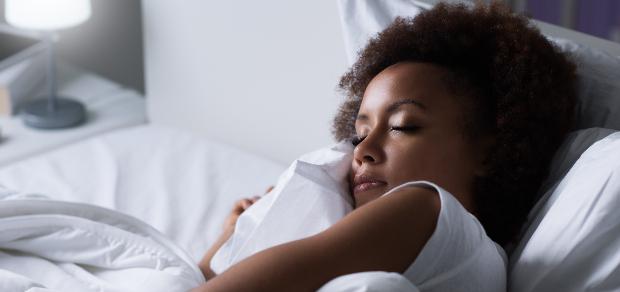
5 Ways to Sleep Better When You Have Psoriasis
Self-care is crucial if you have psoriasis; but often, even the basics can be difficult to achieve—including a good night’s sleep. If you’re struggling with a lack of decent shut-eye, you’re not the only one. A 2018 Reumatologia study found about 58 percent of psoriasis patients to have poor sleep quality. Another larger 2019 study published in Dermatology and Therapy analyzed data provided by the National Psoriasis Foundation and found that up to 85 percent of those with psoriatic disease reported having trouble sleeping.
Thankfully, there are some ways you can set yourself up for better quality sleep.
Fight the Itch
Likely the most common reason for psoriatic sleep disturbances is itch, says Dana Marshall, M.D., board-certified dermatologist at Klinger & Marshall Dermatology in New Orleans, Louisiana. “Severe itching can awaken patients multiple times per night, or can stop them from initially falling asleep,” Marshall says. “Often, the itching is worse at night.”
Nobody really knows why this is the case, but it could be that people’s minds are at rest and can actually focus more on their symptoms at night. “The next day will be impacted as this lack of sleep will start to take its toll,” says Erum Ilyas, M.D., board-certified dermatologist at Montgomery Dermatology in King of Prussia, Pennsylvania.
Also, psoriasis may affect thermoregulation, which is a natural process that allows the body to maintain its core internal temperature. The skin is responsible for thermoregulation, Ilyas explains, and the inflammation of psoriasis can interfere with the process. “It makes people feel like they are experiencing chills or hot flashes, at times,” she explains.
Both Marshall and Ilyas say that the first step in trying to improve sleep is to re-examine your psoriasis treatment regimen, which should take every aspect of your psoriasis into consideration. If you find you’re having itchy or uncomfortable flare-ups, see your dermatologist and ask if there’s another treatment plan that might help you stay more comfortable.
For example, a prescription antihistamine may help to improve the itch, says Marshall. The bonus? “This can help patients sleep better by causing drowsiness,” she says.
Psoriasis treatment options include topical, oral and biologic psoriasis medications, as well as narrowband UVB phototherapy performed by a medical professional.
Reduce Scaling
Another way psoriasis can affect sleep is scaling. “Some of my patients are much more aware of the flaking and scaling as their skin moves under the bedsheets, which draws attention to their skin changes,” Ilyas says.
Having a personalized treatment plan is also key to reducing scales. “When psoriasis is aggressively treated, sleep is more likely to improve,” Marshall says.
She recommends showering at the end of the night, to soften scales, and patting the skin dry before applying topical treatments. “Cover areas with the thickest scales with plastic wrap or just put pajamas on immediately after,” she says.
Cool Down at Bedtime
If you manage your psoriasis with topicals, Ilyas suggests timing the evening application of your steroid creams to right before bedtime to maximize effectiveness. Cooling the skin may also help. “As the skin heats up with inflammation, itching tends to be more severe,” she explains. “Taking cool showers, applying cool compresses and keeping a fan in the room can help. I often recommend keeping a moisturizer or a menthol topical, such as Sarna, in the refrigerator to maximize its cooling effect on application.”
Practice Good Sleep Hygiene
Some healthy bedtime habits can set you up for a better night’s sleep too. Keep your room cool—between 60 and 72 degrees Fahrenheit is generally considered most conducive to sleep. Don’t overeat before bedtime and stick to light, easily digested, protein-rich snacks. You can aim for a brisk walk or jog about an hour before you turn in but avoid vigorous exercise right before bed.
If you find yourself waking up during the night because you’re too hot, wear breathable cotton pajamas to help wick away sweat and keep you dry and cool—or even try sleeping naked.
Manage Stress
While there are a number of studies evaluating how psoriasis can lead to sleep disturbances, there’s no direct study looking at whether poor sleep can directly cause psoriasis flares. However, many studies suggest that stress is a common trigger for psoriasis.
“Theoretically, a lack of sleep can be considered a stress on the body,” Ilyas says. So, it’s conceivable that sleep disturbances could potentially cause a flare. To help reduce stress, try meditation and breathing exercises, take regular exercise and dedicate some time to self-care every day—whatever that means to you. This could be doing yoga, reading a book, spending time in nature, or writing in a journal. You just might find that reducing your stress helps you sleep better, too.
If you’ve tried everything to improve your sleep and still find yourself struggling to fall asleep or waking up during the night, you might try considering a prescribed sleeping pill or an over-the-counter remedy like melatonin. No major contraindications exist with most psoriasis medications and these sleep aids, Marshall says, but it’s always important to check with your doctor about any possible interactions before taking something. Plus, your doctor might be able to help you find a better path to a good night’s rest, Marshall adds, “We always try to treat the psoriasis itself, so that patients won’t need prescription meds for sleep.”
You May Also Like:
Want to Read More?
Access all of Twill Care’s content, community, and experts for free!
Already a member? Login
Want to Read More?
Access all of Twill Care’s content, community, and experts for free!
sign UP For FreeAlready a member? Login

